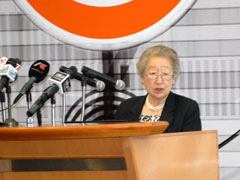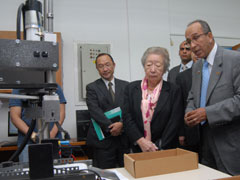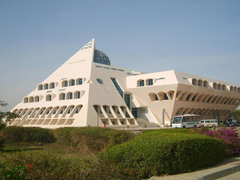- Home
- About JICA
- President's Desk
- Former President's Visits & Remarks
- OGATA Sadako
- With Japanese Help, a New Dawn for Higher Education in Egypt
OGATA Sadako
June 4, 2010
With Japanese Help, a New Dawn for Higher Education in Egypt
 JICA President Mrs. Ogata addresses opening ceremony of the new university.
JICA President Mrs. Ogata addresses opening ceremony of the new university.
A new science and technology university which will address many of Egypt’s educational and industrial dilemmas and hopefully establish itself as one of the world’s leading universities within a decade was officially inaugurated Thursday (June 3).
The opening, attended by Prime Minister Ahmed Nazif, Japanese Ambassador Kaoru Ishikawa and JICA President Sadako Ogata, is the culmination of six years of collaboration between Japan and Egypt which initially began in 2004.
The officially named Egypt-Japan University of Science and Technology (E-JUST) will offer undergraduate and graduate courses in business, culture and engineering, with JICA paying particular attention to the latter activities.
Initially, it will help tackle some of Egypt’s chronic domestic problems, but eventually hopes to develop into a regional center of excellence in science and technology and within a decade, according to officials associated with the project, become one of the world’s top 500 universities.
 JICA President Mrs. Ogata tours the university facilities.
JICA President Mrs. Ogata tours the university facilities.
Prime Minister Nazif touched on the same subject during his speech. 'Innovation' is the key word, he told guests and the new university will provide the link between pure research and innovative and practical economic use.
The university will become an 'island of science and technology' not only in Egypt but within 10 years in the wider region. He emphasized in particular that the center could help Africa to the south develop a new generation of leaders in the field.
Throughout its history as one of the world’s most ancient civilizations Egypt has been a regional and international center of learning. But with a burgeoning population of more than 70 million people it faces daunting challenges.
Its universities are overflowing. Cairo University alone has 260,000 students and a pupil-professor ratio of 26-1 compared with a 10-1 norm at top Japanese universities.
There is a major brain drain of graduating students seeking either higher paying jobs overseas or better ongoing higher education.
There are few links between universities and domestic industries struggling to compete in an increasingly competitive globalized market and provide jobs for school leavers.
Impressed with Japan’s post World War II record, educational excellence and economic reconstruction, particularly in hi-tech fields, Egypt asked for Japanese assistance to develop a similar establishment for higher education based on Japan’s experience.
Helping to establish the university JICA, in one innovative move, brought together government ministries, academics and industrial leaders and 12 Japanese universities to explore each other’s needs and develop relevant programs.
 The temporary campus for the science and technology university.
The temporary campus for the science and technology university.
Even before the June 3 official opening, graduate courses in three of seven engineering facilities began in February on a temporary campus in the newly established city of New Borg El-Arab near the Mediterranean City of Alexandria.
Undergraduate courses in areas such as business and culture will be added later.
In a five year project running through 2013, the Japanese development agency will provide training for instructors and operational staff in the engineering and education sectors, develop further educational programs and promote university-industry cooperation. Another phase is planned after that.
Egyptian and Japanese officials describe the venture as a win-win situation for both sides.
The university will enhance science and technology education, emphasizing moral and business ethics, vital for any developing country to realize its full economic potential.
It will establish a base-line for higher education excellence, developing continuing education courses, providing internationally recognized degrees and aiming for a 90% job rate among graduates within one year – an ambitious target in a region plagued by chronic unemployment.
The university will assimilate the Japanese model for both development and nation building and promote the transfer of technology know-how to Egypt’s industrial sector.
The university will also act as a showcase for Japanese culture, values, language and technology in Egypt, the Arab states and Africa. It will serve as a platform for ‘science and technology diplomacy’ and give Japan a greater understanding of regional market needs and dynamics allowing Japanese companies to outsource business operations and activities to the region.
JICA has been involved in education projects in developing countries since its inception. For many years these programs focused on general primary education and vocational training.
But that has begun to change. Recognizing the particular importance of science and mathematics in promoting national economic growth, JICA is currently involved with more than 30 African nations in promoting those two specific subjects.
Higher education, particularly in such fields as information technology, has become increasingly key. JICA has worked closely with Rwanda in that field as that central African country continues to rebuild in the aftermath of the 1990s genocide.
On a wider level, JICA has provided support to universities in countries ranging from Eastern Europe to Asia and Africa. It has supported the King Mongkut Institute of Technology in Thailand and the so-called AUN/SEED Net project which linked a series of engineering universities throughout the Association of South East Asian Nations (ASEAN).
And as Dr. Surin Pitsuwan, general secretary of ASEAN has said: “Creativity is a secret for a country’s economic growth”.
- About JICA
- News & Features
- Countries & Regions
- Our Work
- Thematic Issues
- Types of Assistance
- Partnerships with Other Development Partners
- Climate Change / Environmental and Social Considerations
- Evaluations
- Compliance and Anti-corruption
- Science and Technology Cooperation on Global Issues
- Research
- JICA Development Studies Program / JICA Chair
- Support for the Acceptance of Foreign HRs / Multicultural and Inclusive Community
- Publications
- Investor Relations
